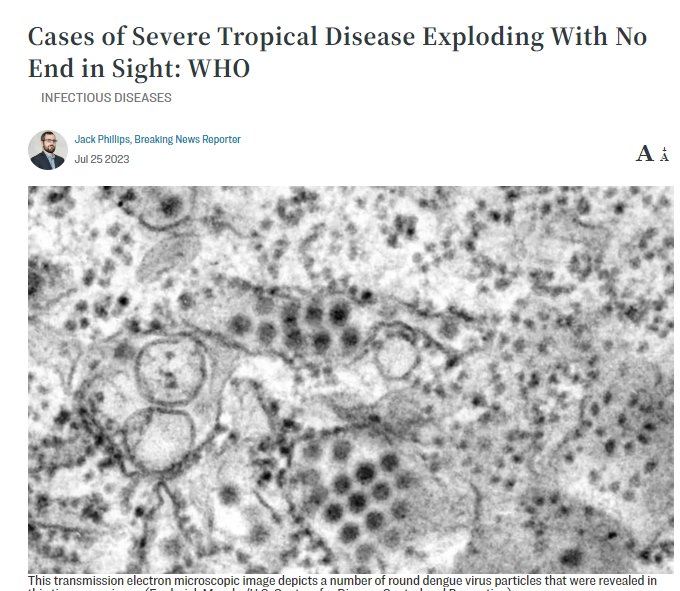The World Health Organization (WHO) has warned that dengue fever cases could reach all-time highs this year. According to a WHO official, on 21st July, dengue fever rates are rising globally, with reported cases increasing eightfold since 2000 to 4.2 million by 2022.
The WHO claimed in January that dengue fever is the world’s fastest-spreading tropical disease and that it could pose a “pandemic threat,” for a change!
What is dengue? According to the CDC, dengue fever can be caused by the dengue virus and is transmitted primarily via the Aedes aegypti mosquito. It usually comes with a fever accompanied by nausea, vomiting, rash, aches and pains, with symptoms lasting between two and seven days. There is no specific medicine for it and people usually recover without hospitalization. However, according to Dr David O. Freedman, there is a second critical phase in some patients wehre fluid leaks out of the circulation and gets into body spaces which might lead to abdominal tenderness, pain, vomiting, fluid in body spaces, bleeding from the mouth and elsewhere and lethargy.
Albeit there is no cure, however we have the Takeda Pharmaceuitcal Co.’s vaccine, branded as QDENGA, which was authorized in the EU in 2022 for all those aged four and older. It has also been authorized in the UK, Brazil, Argentina, Indonesia, and Thailand. There was also the 2015 licensed Sanofi’s Dengvaxia, the world’s first dengue vaccine, which was scaled back after it emerged that it increased the risk of severe disease in ‘seronegative’ children.
According to a March health ministry report, the disease was discovered for the first time in Sudan’s capital Khartoum, while Europe has reported an increase in cases and Peru declared a state of emergency in most regions.
According to Raman Velayudhan, a specialist at the WHO’s control of neglected tropical diseases department, approximately half of the world’s population is now at risk.
Cases reported to the WHO reached an all-time high of 5.2 million in 129 countries in 2019, according to Mr. Velayudhan via video link.
The world is on track for “4 million plus” cases this year, owing primarily to the Asian monsoon season. Close to 3 million cases have already been reported in the Americas, he said, adding that the southern spread to Bolivia, Paraguay, and Peru is a concern.
Argentina, which has experienced one of the worst dengue outbreaks in recent years, is sterilizing mosquitos by altering their DNA before releasing them into the wild.
Mr. Velayudhan said that “The American region certainly shows it is bad and we hope the Asian region may be able to control it.”
With 974 deaths, officials in the European Union said that as of June 8, 2023, some 2.1 million worldwide cases have been reported.
Coralith Garcia, associate professor at the school of medicine at Cayetano Heredia University in Peru, told Fox News that “Dengue is occurring in urban areas where it did not exist before” adding that the virus is on the rise in Peru because “it’s so crowded that anything can happen.”
“‘But Peru had the highest COVID mortality rate [in] the world and now we have several patients dying of dengue, confirming that the Peruvian health system is very weak,’ Ms. Garcia said.”
But the world has seen a mass roll-out of the deadly and experimental Covid-19 vaccines, so what could go wrong?

